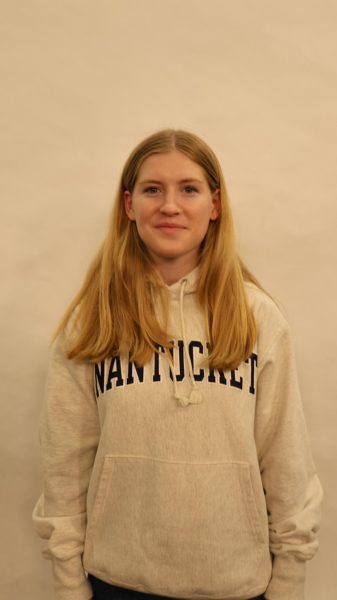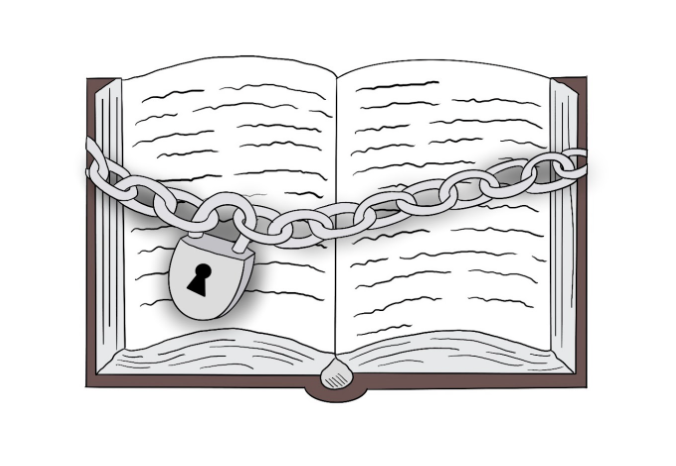In October of every year, the Menlo Library has a Banned Book week that features books that have been banned in other states. For example, “Gender Queer” by Maia Kobabe, “The Giver” by Lois Lowry, “Stamped” by Jason Reynolds and Ibram X. Kendi, and many more. There are rarely any books contested in the Menlo community, according to Assistant Librarian Tracey Bobrowicz.
“We have a policy and process in place where if a book gets challenged or presented to us, then we form a committee,” Brittney Otero, Menlo’s Head Librarian said. The committee would consist of the head librarian, several faculty members and other administrators. Then if the challenged book meets the requirements, the committee addresses it with the community member. “We would review the challenged book using our material selection criteria that’s laid out in our collection development policy,” Otero said. Then the committee would make a recommendation based on that review process, then the Head Librarian would prepare a written report and submit it to school administration. “While under the review process, […] the book would remain in the collection,” Otero said.
Challenging a book is attempting to restrict or remove the material because of the content. To challenge a book, a person in the school’s community must bring up their concerns with someone working at the school. Each community has different protocols for challenging books. When a book is challenged, certain pages or excerpts could be restricted or the book could be removed from the library. A book is considered banned if it’s removed from the library or curriculum because of its content. Most public schools have a board of elected officials who have the power to remove books from schools and libraries they oversee.
According to Assistant Librarian Tracey Bobrowicz books are rarely challenged at Menlo because “parents support our educational objectives as a school,” Bobrowicz said. “If I were sending my student to Menlo School, I would know, based on the information I had about the school and looking at the library website, that this is a school that really encourages students to learn about the world, themselves and have an appreciation and understanding of different views and perspectives.”
According to Margaret Ramsey, an Upper School English teacher, Menlo values student curiosity and critical thought. “I think we’re just an open minded place, and we put a value on thinking broadly and putting things in context,” Ramsey said.
English teachers and the librarians at Menlo encourage students to read books that are frequently banned in other parts of the nation, particularly during a student’s freshman year when students pick out an independent book to read that has been commonly banned. Otero thinks that banning books “fosters the closing of minds, and it doesn’t open up minds and open up perspective,” Otero said. “So we don’t really get to learn from one another and our shared experiences and our shared perspectives or differing perspectives,” Otero said. According to Ramsey, banning books is harmful on a lot of levels, “the biggest thing that banning books worries me about is what it does in terms of like creating cultures of fear,” she feels like “It drives a lot of fear [and] stereotyping,” Ramsey said.
Many challenged books have LGBTQ themes or characters, focus on communities of color or on the history of racism. Ramsey thinks that parents challenge books out of fear. “I think largely, it’s sort of these ideas that feel radical to certain cultures and create fear,” Ramsey said. “A lot of these sort of banned book conversations start with parents, who think that maybe some of the content is too mature or too adult for their children,” she added.
Others challenge books with the intention of protecting students from trauma. In 2020, Burbank Unified School district barred the teaching of five classic American books, including Harper Lee’s To Kill a Mockingbird, over concerns about their inclusion of a slur used against Black people harming the districts’ Black students.
When books are banned, it’s not a national or state-wide ban; it’s usually just at one school or library, so although a lot of the same books are banned across the country, they are not banned everywhere at once. According to Ramsey, reading banned books is “an act of independence and an act of using your education and thinking deeply.” She went on to say that reading banned books is “a really important […] first step into your sense of like, controlling your own environment, and […] what you take into your mind,” Ramsey said. “Freedom and access to information of all types is really important to help build those bridges and connections,” Brittney Otero, Menlo’s head librarian, said.
Menlo participates in Banned Books Week in October every year. The American Library Association started the Banned Books Week event in 1982, which is meant to spread awareness about censorship and to celebrate the freedom to read. “Each year, we put up unique displays that highlight the year’s most challenged books and books that have been historically banned or censored across the country,” Otero said.

